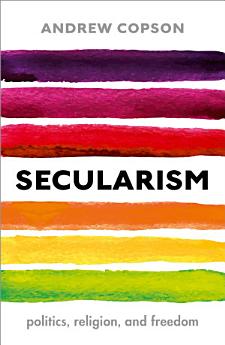Secularism: Politics, Religion, and Freedom
сеп 2017. · Oxford University Press
E-knjiga
176
Stranica
family_home
Ispunjava uslove
info
reportOcene i recenzije nisu verifikovane Saznajte više
O ovoj e-knjizi
Until the modern period the integration of church (or other religion) and state (or political life) had been taken for granted. The political order was always tied to an official religion in Christian Europe, pre-Christian Europe, and in the Arabic world. But from the eighteenth century onwards, some European states began to set up their political order on a different basis. Not religion, but the rule of law through non-religious values embedded in constitutions became the foundation of some states - a movement we now call secularism. In others, a de facto secularism emerged as political values and civil and criminal law altered their professed foundation from a shared religion to a non-religious basis. Today secularism is an increasingly hot topic in public, political, and religious debate across the globe. It is embodied in the conflict between secular republics - from the US to India - and the challenges they face from resurgent religious identity politics; in the challenges faced by religious states like those of the Arab world from insurgent secularists; and in states like China where calls for freedom of belief are challenging a state imposed non-religious worldview. In this short introduction Andrew Copson tells the story of secularism, taking in momentous episodes in world history, such as the great transition of Europe from religious orthodoxy to pluralism, the global struggle for human rights and democracy, and the origins of modernity. He also considers the role of secularism when engaging with some of the most contentious political and legal issues of our time: 'blasphemy', 'apostasy', religious persecution, religious discrimination, religious schools, and freedom of belief and thought in a divided world.
O autoru
Andrew Copson is the Chief Executive of the British Humanist Association, where he was previously Director of Education and Public Affairs; President of the International Humanist and Ethical Union; and a former Director of the European Humanist Federation. In these capacities he is one of the most experienced and prolific advocates of secularism, its study, and its implementation. For over a decade he has carried out a range of national and international practical secularist policy work and spoken internationally on secularism. He has been an associate of the Centre for Law and Religion and the University of Cardiff since 2008 and represented the secularist point of view on public or other bodies such as the Foreign Office's Advisory Panel on Freedom of Religion or Belief and the Woolf Institute's Commission on Religion and Belief in British Public Life. He co-edited The Wiley-Blackwell Handbook on Humanism (Wiley-Blackwell, 2015), with A C Grayling.
Ocenite ovu e-knjigu
Javite nam svoje mišljenje.
Informacije o čitanju
Pametni telefoni i tableti
Instalirajte aplikaciju Google Play knjige za Android i iPad/iPhone. Automatski se sinhronizuje sa nalogom i omogućava vam da čitate onlajn i oflajn gde god da se nalazite.
Laptopovi i računari
Možete da slušate audio-knjige kupljene na Google Play-u pomoću veb-pregledača na računaru.
E-čitači i drugi uređaji
Da biste čitali na uređajima koje koriste e-mastilo, kao što su Kobo e-čitači, treba da preuzmete fajl i prenesete ga na uređaj. Pratite detaljna uputstva iz centra za pomoć da biste preneli fajlove u podržane e-čitače.







